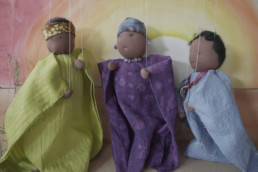
In Fiber Arts teacher Barbara Freiberg’s classroom, Susquehanna Waldorf School’s Class 7 students busily transform lengths of thread and swatches of fabric into playful marionettes for their May performance of “Folktales from Africa.” The work is fun—but it is also grounded in the classwork and the student’s developmental needs.
The marionette play is, as all class plays in Waldorf education are, connected to one of the curriculum blocks. For Class 7, the “Folktales” play reinforces and enriches their study of Africa. Touching on geography, culture and people of the different African regions, the marionettes, alongside other art-centered projects, carry the goal of a deeper experience with the subject matter.
In addition to bringing the curriculum to life, class plays at SWS meet students where they are developmentally and seek to address the struggles felt by the particular age group. Class 7 students entering adolescence, a stage of heightened self-awareness, find comfort in their role working with marionettes, as they can reveal their character behind the scenes instead of out in the spotlight. The teacher is able to stretch the skills and capacity in students this way, but from a place that is comfortable for their age. The play also strengthens the sense of interdependence among the whole class, and uncovers a new appreciation for each other.
As each puppet dances lightly from the marionette strings, Class 7 students smile and recite the lines they have worked diligently to memorize. How they enter their character and respond to each other through practice prepares them for their performance, as well as their final eighth grade production in the coming year, but it also prepares them for life—a gift that goes well beyond the stage.
